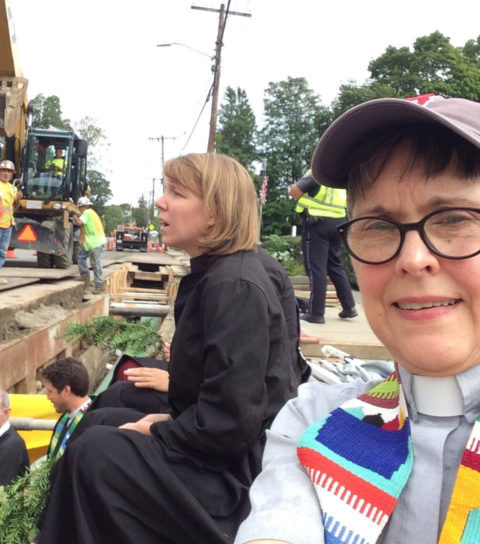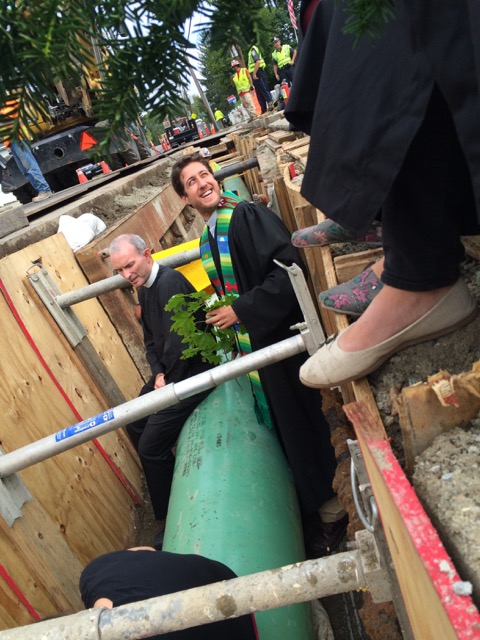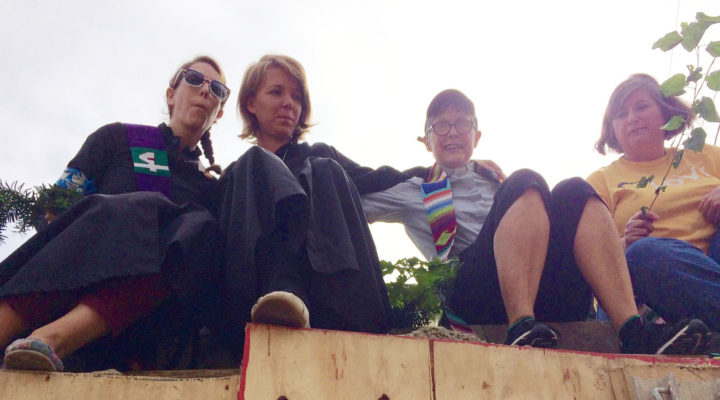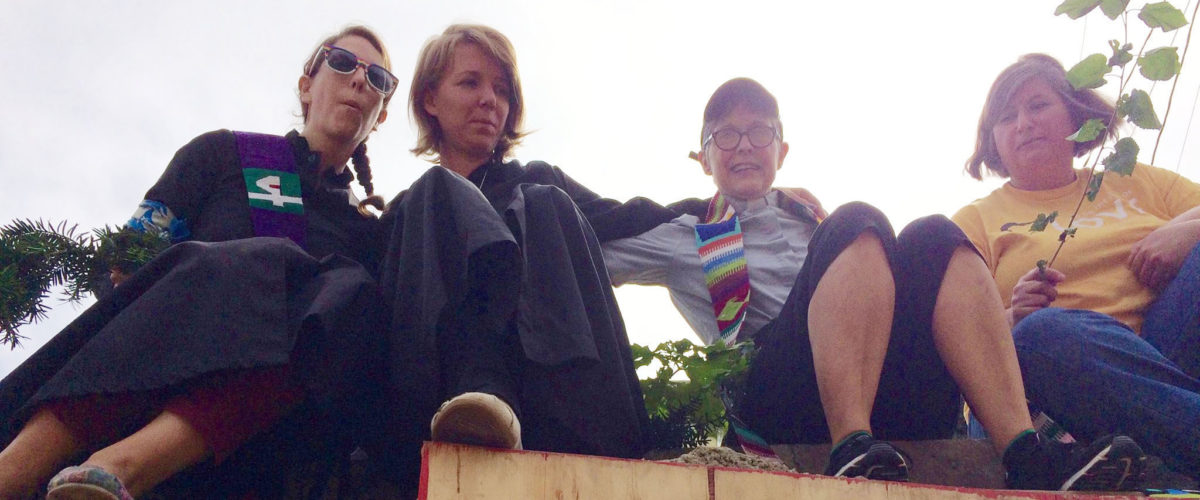Like many who grew up Southern Baptist, Betsy Sowers fervently believes evangelism is the answer to the most pressing issues of the day.
“I am very Baptist about that,” the Massachusetts resident said.
But Sowers doesn’t define evangelism only as talking to people about her faith. Nowadays, it also means attending protests, supporting the oppressed and sometimes going to jail.
And that’s exactly what she and nine others — including two other Baptists — did during a Sept. 20 pipeline protest in West Roxbury, Mass. The West Roxbury pipeline is a component of the larger project of Houston-based Spectra Energy Corp. to carry fracked natural case to New England. It has drawn large protests from environmental justice activists.

Betsy Sowers, right, and UCC minister Lindsay Popper in the pipeline trench in West Roxbury, Mass., prior to their arrest on Sept. 20. (Photo courtesy Betsy Sowers)
“Evangelism is not just believing things about Jesus but really following and doing the kinds of things that Jesus was doing and standing in that prophetic tradition,” said Sowers, minister for Earth justice at Old Cambridge Baptist Church, an American Baptist congregation in Cambridge, Mass.
Some people may be surprised to read such comments from a Baptist minister. But Sowers and others testify there is a healthy Baptist civil, environmental and social rights movement that is highly visible during ecumenical and interfaith protest events around the country.
What they share, participants say, is a bedrock conviction that faith is about action.
‘I see Baptists everywhere I go’
“In our context, Baptists have practiced full-bodied faithfulness in issues of justice for decades,” said Cody Sanders, pastor at Old Cambridge Baptist.
Members of the church were active in the civil rights movement, provided medical care for wounded Vietnam War protesters and participated in the Sanctuary Movement in the 1980s. These and other actions put the church and its people on the front lines of social strife and healing, Sanders said.
“These practices are wholeheartedly supported by the congregation,” he said about Sowers’ protest and arrest last week. “It’s about preaching justice and putting our bodies on the line.”
Sanders also has participated in events, including a recent Moral Monday protest at the Massachusetts statehouse. There were many Baptists there, along with other denominations and faiths, he said.
“I see Baptists everywhere I go and in good numbers.”
‘Arrested in the struggle for justice’
Ian Mevorach is one of the Baptist ministers arrested with Sowers during the pipeline demonstration last week.
Their plan was to be arrested at the site. Some 40 other supporters from various churches, including several from Old Cambridge, cheered and prayed for those who had gone — illegally — into the trench.
Mevorach is co-founder and spiritual leader of Common Street Spiritual Center, an emerging church community in Natick, Mass.
 The ABC-USA minister said Martin Luther King Jr. is one of his models in waging nonviolent civil disobedience in various causes, including environmental justice.
The ABC-USA minister said Martin Luther King Jr. is one of his models in waging nonviolent civil disobedience in various causes, including environmental justice.
“Many of us are inspired by this figure,” he said. “He is famous for being … arrested numerous times in the struggle for justice.”
Another leader for Baptists is Roger Williams, the 17th century Puritan-turned-Baptist expelled from the colony of Massachusetts for advocating religious freedom.
“There is solidarity for those who struggle for justice that goes back to Jesus,” Mevorach said. “He struggled for economic justice, equality in society and for freedom of religion.”
‘Planned and strategic’
Following Jesus’ example in this way is a profound experience, said Ashley Anderson, a deacon at First Baptist Church in Jamaica Plain, Mass. She was also arrested with Sowers and Mevorach.
“It feels deeply faithful to me,” she said.
Anderson is no stranger to running afoul of law enforcement during protests. In 2014, she was among several arrested for tying themselves to a fence around the White House while protesting the Keystone XL Pipeline project.
Anderson and others arrested during these demonstrations usually know ahead of time they’ll be going to jail.
“It’s planned and hopefully strategic,” she said. “But I try not to glorify being arrested. I just feel convicted it is the right thing to do.”
The purpose of being intentionally arrested is to bring attention to the wide variety of injustices facing people around the world, and especially to those on the margins, Anderson said.
“Civil disobedience that is prayerful is a way of claiming some amount of power in a world where the corporations have taken charge.”
“And it’s not about winning,” Anderson added. “It’s more about asking what’s the best way I can love the world, and then going out and doing that.”
‘It is very embodied’
The arrests last week were only a part of that day’s anti-pipeline events in West Roxbury.
Before arriving at the site, participants met in a local church for ecumenical worship that highlighted the sacredness of water and expressed solidarity with opponents of a pipeline project in Standing Rock, S.D.
After arriving at the pipeline trench, Anderson, Mevorach, Sowers and other ministers blessed the upturned ground with water blessed during the preceding worship service. They then entered the trench and, for that, were eventually taken into custody by police.
“We stand in that prophetic tradition not only because we read the Bible or believe certain things, but because we are literally bringing the same presence that Jesus brought,” Sowers said.
Their act, and others like it, are meant to inspire others to action, she said.
“We call people to change as Christ called people to change. It is very embodied.”


